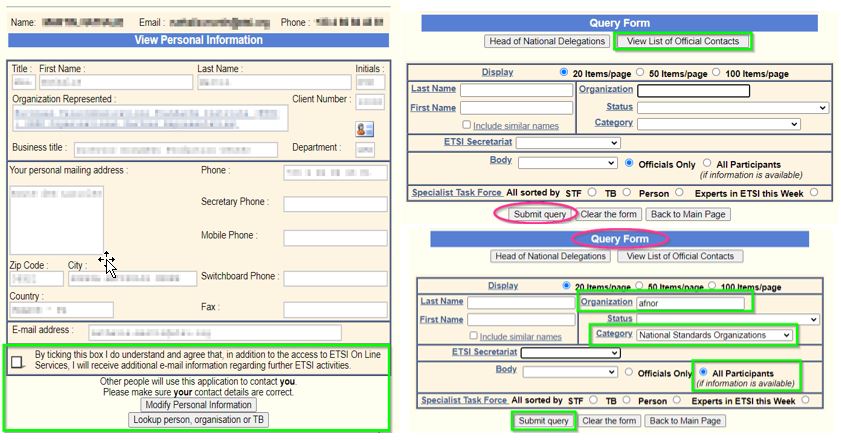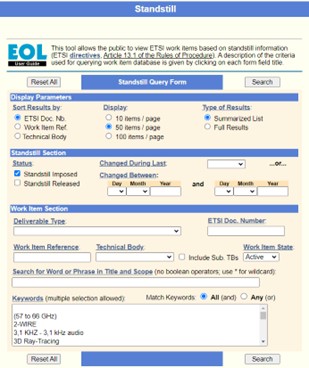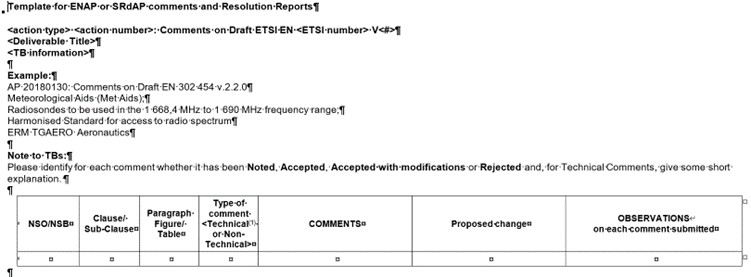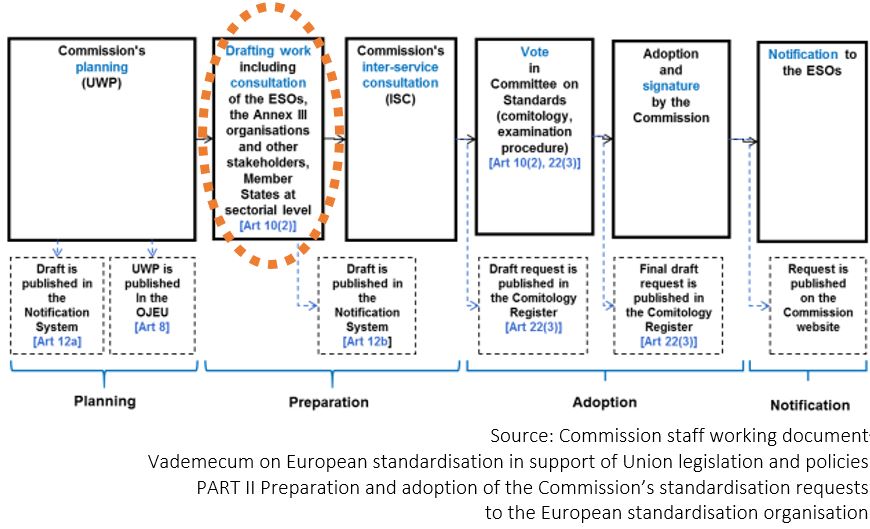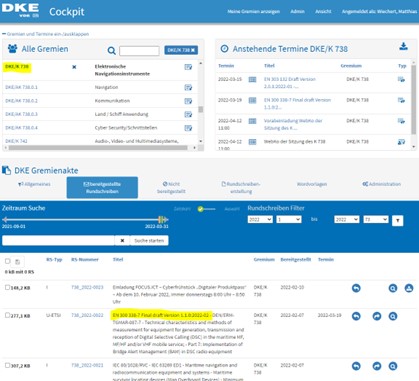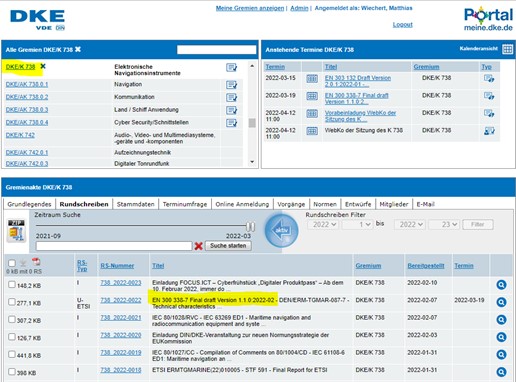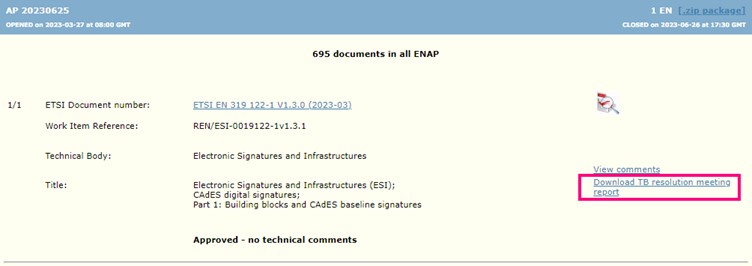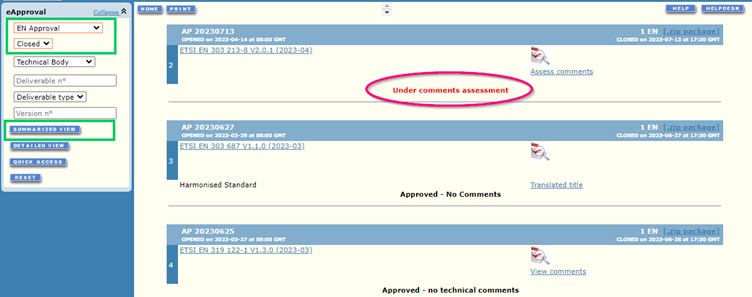NSOs Guide: Difference between revisions
| Line 296: | Line 296: | ||
===ETSI NSO_INFO=== | ===ETSI NSO_INFO=== | ||
This email distribution list is used by ETSI Secretariat to spread information to all the NSO Official and Voting Contacts. Any subscribers to this distribution list can also post to the list to share information. This email distribution list is automatically and dynamically updated every day. Official and Voting contacts details are taken from the ETSI Directory Services. For the people manually added to the list, a yearly update is launched by the Secretariat. The list can be manually updated on request at any time, when needed. All emails sent to the list are archived and made available here. | This email distribution list is used by ETSI Secretariat to spread information to all the NSO Official and Voting Contacts. Any subscribers to this distribution list can also post to the list to share information. This email distribution list is automatically and dynamically updated every day. Official and Voting contacts details are taken from the ETSI Directory Services. For the people manually added to the list, a yearly update is launched by the Secretariat. The list can be manually updated on request at any time, when needed. All emails sent to the list are archived and made available here. | ||
NOTE: Should a new name be subscribed to this list please contact [mailto:webvote-contact@etsi.org webvote-contact@etsi.org]. | NOTE: Should a new name be subscribed to this list please contact [mailto:webvote-contact@etsi.org webvote-contact@etsi.org]. | ||
Revision as of 14:54, 15 May 2024
Introduction
This guide provides a step-by-step guidance on the essential elements, most common practices and responsibilities of the National Standards Organizations (NSOs) and National Standardisation Bodies (NSBs).
An NSO is an organization that develops, maintains and coordinates voluntary standardization activities in a particular country. NSOs typically represent the interests of various stakeholders, including businesses, consumers, academia and government.
An NSB is an NSO from the European Economic Area and thus from one of the following countries: Austria, Belgium, Bulgaria, Croatia, Cyprus, Czech Republic, Denmark, Estonia, Finland, France, Germany, Greece, Hungary, Iceland, Ireland, Italy, Latvia, Liechtenstein, Lithuania, Luxembourg, Malta, The Netherlands, Norway, Poland, Portugal, Romania, Slovakia, Slovenia, Spain or Sweden.
The information contained in this guide is based on the Rules of Procedure (RoP) and Technical Working Procedure (TWP) contained in the ETSI Directives, the European Commission Regulations (EU) N° 1025/2012, and amendment N° 2022/2480 and also on the ETSI-NSO Agreement.
Roles
The NSO/NSB Official Contact
The Official Contact is the person designated by the NSO to be the main contact person between ETSI and the NSO. There is only one Official Contact per NSO, ensuring that all the contact details within the organization are correctly registered in the ETSI Directory Services application. Contact details can be consulted via the Directory Services page.
The NSO Official Contact is responsible for the following tasks within the represented country:
- ensuring that no national standardization activity or publication of any new or revised standard, which could prejudice the preparation of a standard, is undertaken during the Standstill period of a European standard (EN);
- carrying out the Public Enquiry (PE);
- establishing the national position of the represented country;
- ensuring the withdrawal of any conflicting national standards with any recently adopted ENs.
The NSB Official Contact has the same responsibilities listed above plus:
- participating in the EC/EFTA Standardisation Requests (SReq) drafting process;
- participating in the Weighted National Voting procedure to accept SReqs;
- participating in the Weighted National Voting procedure to adopt Work Item(s) identified in the Standardisation Request (WISR); and
- providing ETSI with the title translations into the mandatory official languages via the e Approval application.
The NSO/NSB Voting Contact
The Voting Contact is a person designated by the Official Contact to cast votes during Weighted National Voting procedures and submit comments during Public Enquiries.
The Official Contact may decide to be also considered as a Voting Contact. It is possible to have several Voting Contacts within the same organization, but only the last vote cast by the Voting Contact of an NSO during a Weighted National Voting procedure will count. It is the responsibility of the NSO to decide which Voting Contact can vote, the ETSI Secretariat has no responsibility in this area.
In specific conditions, the Weighted National Voting procedure may take place at the ETSI General Assembly level, and in such a case, it is the responsibility of the Head of each National Delegation to cast a vote, after consultation of the relevant NSO.
Head of National Delegation (HND)
The Head of National Delegation is the person appointed by a National Delegation (i.e. the ETSI Full members from the same country) and notified to the Director-General. The Head of National Delegation shall be appointed amongst the representatives of the organizations forming the National Delegation.
The ETSI Secretariat Primary Contacts
The role of the Primary Contacts consists in:
- providing meeting facilities and organizing meetings;
- facilitating communication within the groups;
- helping wherever possible the NSOs/NSBs achieving their strategic goals; and
- supporting the NSO/NSB Groups completing their duties using the tools put in place to make their tasks easier.
NSO-ETSI meetings
The ETSI Director General will have periodic meetings with the NSOs to manage the co operation established in the ETSI-NSO Agreement.
Those meetings may be hybrid (combination of a physical meeting with physical and remote participation via electronic means) or fully held online via electronic means.
Agreements
ETSI-NSO Agreement
All recognised NSOs/NSBs notified to the ETSI Director-General under Article 13.2 of the Rules of Procedure are entitled to sign the ETSI-NSO Agreement.
Sales Agreement
ETSI undertakes to give the right of publication to the NSOs/NSBs to sell ETSI Deliverables against payment of royalties. The Sales Agreement does not supersede the terms of the ETSI-NSO Agreement and is a separate Agreement concerning the Distribution of ETSI Publications. The Legal department is in charge of issuing such agreements (legal@etsi.org).
Responsibilities
Standstill
Standstill is the obligation accepted by the NSOs and the ETSI members not to undertake any national standardization activity which could prejudice the preparation of an EN or a European standardisation deliverable and, not to publish a new or revised standard which is not completely in line with an existing EN or European standardisation deliverable. Standstill applies to an individual work item leading to an EN or a European standardisation deliverable and accepted by the ETSI General Assembly, with a precise scope and target date. It does not apply to areas or programmes of work as such. General provisions are given in Article 13.3.2 of the Rules of Procedure. The ETSI Standstill application allows anyone to view the ETSI Work Items under the perspective of the available Standstill information.
Imposition and release of standstill
Following the adoption by the responsible Technical Group of a new Work Item (WI) or the endorsement of a new Work Item(s) identified in the Standardisation Request (WISR) intended to result in an EN or a European standardisation deliverable and prior to the drafting of this standard, ETSI shall notify the NSO/NSB as soon as a decision regarding imposition or release of standstill has been made. Standstill shall start sixty (60) calendar days after the adoption of the Work Item (WI) or Work Item(s) identified in the Standardisation Request (WISR), or at the start of the work, whichever date comes later. Standstill remains in force until withdrawal of the EN or the European standardisation deliverable, unless it is released by decision of the ETSI General Assembly.
Infringement of standstill
Standstill is not infringed by:
- the issue by an NSO/NSB of a draft standard for Public Enquiry intended and designated as a contribution to ISO/IEC and/or CEN/CENELEC/ETSI standardisation;
- the publication by an NSO/NSB, within three (3) months of the start of standstill, of a national standard which that NSO/NSB has already approved;
- the publication by an NSO/NSB, after notifying the ETSI Director-General, of a national standard adopting, without change, a published ITU-T or ITU-R Recommendation or a standard in the field of ETSI's interest prepared by the ISO/IEC, where there is neither an EN nor a European standardisation deliverable already in existence.
In cases 2) and 3) the NSO/NSB commits itself to aligning the national standard with the eventual EN or European standardisation deliverable, when issued.
EN Approval Process (ENAP)
ETSI may elaborate ENs on proposal from at least four (4) Full and/or Associate members in accordance with the provisions of Article 2.2.1 of the Technical Working Procedure. These ENs shall be adopted by the eligible NSOs through the ENAP as specified in Article 13.2 of the Rules of Procedure.
Participation to the combined Public Enquiry + Weighted National Voting procedure
An Approval Procedure (AP) is a national consultation undertaken by each NSO in its country to evaluate the likely acceptance of an EN. The AP period (90 calendar days) may be extended by ETSI on receipt of a justified request from an NSO.
ETSI undertakes to notify all NSOs the start and end of the AP and to provide access to the relevant EN. The comments, if any, resulting from an AP may be of technical or non-technical nature.
It is necessary to use the ETSI online e-Approval application to cast votes and submit comments. If access to the ETSI servers is denied, please apply for an ETSI EOL account or contact webvote-contact@etsi.org.
Comments shall be submitted using the ETSI dedicated ENAP or SRdAP comments and resolution report template. The template is available on the online e-Approval application home page (see figure 1) or on the ETSI NSOG or NSBG Portal page. See clause 4.2.3 for more details.
Participation to the 2nd Weighted National Voting procedure
A Weighted National Vote is the expression of an opinion resulting from of a national consultation undertaken by each NSO to collect all views expressed in its country on the adoption of a European Standard. A Weighted National Vote shall be carried out over a period of sixty (60) calendar days. The Weighted National Vote period may be extended by ETSI on receipt of a justified request from a NSO. ETSI undertakes to notify all NSOs the start and end of the Weighted National Vote and to provide access to the relevant European Standard.
- IMPORTANT: When a country is represented by more than one NSO, any of the NSOs have the right to vote but only one vote per country shall be counted as vote cast. Votes may be changed by Official or Voting contact of the same country prior to the closing of the vote. Only the last vote casted before the closing of the Weighted National Vote will be considered.
How to submit comments and/or cast votes via the e-Approval application
The NSO undertakes to carry out the public enquiry in its country and to consider all views expressed in its country before deciding how to cast any votes. It is essential to consolidate all comments received by the set deadline, using the ENAP or SRdAP comments and resolution report TEMPLATE.
Some advices for the resolution meeting on dealing with comments collected during the Public Enquiry are given in clause 3.7 of the ETSI Chair's Guide. When the template has been duly filled in and/or the decision to cast a vote has been taken, it is time to access the voting tool. All details on how to submit comments and cast votes on ENAP can be consulted by clicking HERE.
Standardisation Request deliverables Approval Process (SRdAP)
ETSI may elaborate ENs and European standardisation deliverables in response to SReqs to support the European legislation or policies, in accordance with the amended Regulation (EU) No 1025/2012. These deliverables shall be adopted by the eligible NSBs throughout the SRdAP.
Participation to the Standardisation Request (SReq) drafting process
The NSBs, the NSOs and the Annex III organizations, are involved in the ETSI process to comment and/or propose modifications to the working draft SReq text as explained in Articles 20.2 to 20.3.3 of the Rules of Procedure.
The NSB, the NSOs and Annex III organizations will be requested during a meeting organised by the Secretariat, to submit preliminary comments, on the distributed SReq draft. It is possible to invite whomever necessary within a NSB, NSO and Annex III organisation to this meeting. For discussions concerning the distributed SReq draft, managers or policy officers would be more appropriate but since all organizations are different, this depends on the individual structure and organization.
Acceptance of the Standardisation Request (SReq)
When the draft of a new Standardisation Request (SReq) is finalised, the NSBG members will be asked to accept or reject the submitted Standardisation Request within twenty-five (25) calendar days.
During these twenty-five (25) calendars days, each NSBG member may receive comments from the Annex III organizations, the BOARD, OCG members and from the Technical Group. The NSB's national position to adopt or reject the proposed SReq will have to be submitted via the tool.
Upon the closure of the voting procedure of the NSBG members, and within thirty (30) calendar days following the reception by ETSI of the official Standardisation Request (SReq), the Director-General, in the name of ETSI, shall notify the EC and EFTA, the appropriate Technical Group(s), the NSBG, the Annex III Organizations and the whole ETSI membership on the decision of the NSBG.
Adoption of the WISR(s)
Upon receipt of the Work Item(s) identified in the Standardisation Request (WISR) and created by the responsible Technical Group, each NSB should be able to express the national position to adopt or reject/change/stop the proposed WISR via the ETSI online e-Approval application.
Participation to the combined Public Enquiry + Weighted National Voting procedure
The Enquiry + Vote (EV) comprises a Public Enquiry (see Article 21.4 of the Rules of Procedure) and a Weighted National Voting procedure (see Article 21.5 of the Rules of Procedure) performed in a combined procedure undertaken by each NSB in its own country to evaluate the likely acceptance of a European Standard or a European standardisation deliverable. See Article 21.2.1 of the Rules of Procedure for full details.
- Important: The Enquiry + Vote period (90 calendar days) may be extended by ETSI on receipt of a justified request from a NSB.
ETSI undertakes to notify all NSBs the start and end dates of the Enquiry + Vote and to provide access to relevant European Standard(s) or European standardisation deliverable(s).
It is important that comments are submitted using the ETSI dedicated ENAP or SRdAP comments and resolution report template (see clause 4.3.6).
The comments, if any, resulting from an Enquiry + Vote may be of technical or non-technical nature. Guidance and instructions on how to submit comments and cast votes are given in clause 4.3.6.
For all European Harmonised Standards, when submitting comments or casting a vote, a box called "Translated title" is displayed. It is the exclusive responsibility of each NSB whose official language is listed below to provide ETSI with the translation into its own language, via the ETSI online eApproval application.
List of official languages (25): Bulgarian, Croatian, Czech, Danish, Dutch, English, Estonian, Finnish, French, German, Greek, Hungarian, Icelandic, Italian, Latvian, Lithuanian, Maltese, Norwegian, Polish, Portuguese, Romanian, Slovak, Slovenian, Spanish and Swedish.
- Important: In order to have an European Harmonised Standards listed in the OJEU, it is mandatory to have its title translated in all the official languages.
Participation to the 2nd Weighted National Voting procedure
A Vote Adoption is the expression of an opinion resulting from a national consultation undertaken by each NSB to collect all views expressed in its country on the adoption of a European Standard or a European standardisation deliverable.
A Vote Adoption shall be carried out over a period of sixty (60) calendar days.
The Vote Adoption period may be extended by ETSI on receipt of a justified request from a NSB.
ETSI undertakes to notify all NSBs at the start and end of the Vote Adoption and to provide access to the relevant a European Standard or a European standardisation deliverable.
- Important: When more than one NSB represent a country, any of the NSBs have the right to vote but only one vote per country shall be counted as vote cast. Votes may be changed by any of the NSBs of the same country prior to the closing of the vote. Only the last vote casted before the closing of the Weighted National Vote will be considered.
How to submit comments and/or cast votes
The NSB undertakes to carry out the public enquiry in its country and to consider all views expressed in its country before deciding how to cast any votes.
It is essential to consolidate all comments received by the set deadline, using the ENAP or SRdAP comments and resolution report TEMPLATE (see TEMPLATE). Some advices for the resolution meeting on dealing with comments collected during the Public Enquiry are given in clause 3.7 of the ETSI Chair's Guide.
When the template has been duly filled in and/or the decision to cast a vote has been taken, it is time to access the voting tool. All details on how to submit comments and cast votes on SRdAP can be consulted by clicking HERE.
Transposition
Each NSO shall take measures to ensure the visibility of European Standards or European standardisation deliverables on a national level:
- by publication of an identical text; or
- by publication of an endorsement (i.e. publication of an endorsement sheet or official announcement) within a short time after its publication by ETSI.
"Publication of an identical text" means identical in technical content and presentation (except translation) and with no restrictions for application. "Endorsement" means that it shall be stated that the European Standard or European standardisation deliverable has been approved together with the number, title and date, and location from where copies of the text may be obtained.
European Standards or European standardisation deliverables thus published or endorsed, shall be given the status of national standards. It is the responsibility of each NSO to update the ETSI Transposition and Withdrawal database. A user manual guide is provided via the tool itself.
Translation
Once a European Standard or European standardisation deliverable has been adopted and published in English as an official standard, it may be translated into another language and published equally as an official version of the standard.
Each NSO is entitled to translate standards into the language(s) of its own country, in accordance with Article 8 of the ETSI-NSO Agreement.
The costs of all translations of standards shall be covered by the parties interested.
Withdrawal of conflicting national standards
When an EN on a specific matter has been published by ETSI, the NSOs shall ensure that all conflicting national standards on that specific matter are withdrawn on an agreed date set by the General Assembly.
Tools
ETSI online e-Approval application
ETSI NSOs and NSBs are authorized to cast votes and submit comments electronically using the ETSI online e-Approval application.
The ETSI Technical Groups can consult the submitted comments on ETSI European Standards and European standardisation deliverables as soon as an approval procedure is launched. The casted votes are made available at the closure of the approval procedure.
ETSI Work Programme
The ETSI Work Programme application is an application which contains all the information needed with regard to the documents’ version number, title, keywords, status and much more.
It provides an easy way to search for ETSI standards by running dynamic database queries. To download the document, just click on the corresponding download standard icon (on the top right-hand side). Depending on the status as an ETSI member or non ETSI member, one has the option of downloading either the Word® or the PDF version.
This application allows to download individual copies of ETSI publications free of charge.
If further help is needed, please contact us at webvote-contact@etsi.org.
European Standards compared versions
A list can be obtained of the most recent ENs sent on approval compared with the previous published version of the same European Standard (if any).
These documents are made available in order to facilitate the comprehension of the changes made between the two versions. In the same spirit, a list of the latest versions of published European Harmonised Standards compared with the previous versions is made available.
Metadata
ETSI makes information related to the production of deliverables accessible via its website at https://docbox.etsi.org/Metad.
| • WI number | • Schedule/milestones | |
| • Type and document number | • Mandates if any | |
| • Version number | • HS or not | |
| • Procedures/Actions (all) | • Scope | |
| • Title | • Keywords | |
| • Technical Body | • Stage codes |
What is listed above are the weekly collected information of the published ETSI Deliverables, called "metadata", which are made available at https://docbox.etsi.org/Metad/Weekly_Pub/.
They are produced to be imported into electronic tools/applications that any NSOs may wish to develop in order to circulate information in an efficient way, without having to manually record the data for each deliverable recently produced.
DKE has kindly accepted to share their experience in order to explain how the metadata can be used. DKE uses these metadata to circulate information among their experts in national standardization committees. DKE automatically imports the metadata in their own database every week. Metadata from IEC and CENELEC can also be fed in the same tool. After importing the metadata, deliverables can be found in a personalized display of the application. The documents are already allocated to the national mirror committees. Here is an example of the result where DKE/K 738 is the national mirror to ETSI/ERM TG MARINE. Consequently, EN 300 338-7 Final Draft Version 1.1.0:2022-02 has been circulated in this committee. The external experts can perform a single or group download. Users can also get notification emails which can be customized.
This is the internal view that shows where the circulation is done.
Any tool/application can be automatically fed. To do so, it is necessary to create an automatic bulk download. This is something that needs to be put in place by the NSO IT service. ETSI IT can help if necessary. These metadata are password protected. For this reason, it is necessary to log in to access the information. If any difficulties are encountered when accessing the file, please contact us at webvote-contact@etsi.org.
FAQ - Frequently Asked Questions
Where can I find the Technical Group resolution report?
When an action is closed; the Technical Group Chair shall complete the Technical Group resolution meeting report to identify the decision taken in the Technical Group for each submitted comment. Then the report is uploaded on the ETSI online e Approval application.
What does "Under comments assessment" means?
When "Under comments assessment" appears when searching for a closed action, it means that comments have been submitted during the approval process, and the Technical Officer has not yet finalised the categorization assessment.
If a comment categorized as "non-technical" implies technical changes, the NSO who has submitted the comment, can be contacted to discuss the nature of the comment. When all comments have been carefully checked by the Technical Officer/Technical Group, the validation is made, and the results are displayed, and all parties are informed.
What are the existing mailing lists and what are their purposes?
The main mailings list has been made available via the toolkit made available on the NSOG and NSBG home page.
ANNEX_III
This email distribution list is used by the Secretariat to spread information related to the Standardisation Request deliverable Approval Process (SRdAP) to all Annex III Organisations contacts. This email distribution list is manually maintained. All emails sent to the list are archived and made available here (depending on access rights).
DELIVERABLE-NOTIFICATIONS
This email distribution list is used by ETSI Secretariat to weekly send notifications to all NSO Official and Voting Contacts. Additional subscription may be done by clicking here. A link is also provided via the ETSI NSO toolkit made available on the NSOG and NSBG Portal page.
Notification sent to the list subscribers to inform about the ETSI Deliverables which have been published or sent on procedure during the past week. All emails sent to the list are archived and made available here.
ETSI NSB_INFO
This email distribution list is used by ETSI Secretariat to spread information to all the NSB Official and Voting Contacts. Any subscribers to this distribution list can also post to the list to share information. This email distribution list is automatically and dynamically updated every day.
Official and Voting contacts details are taken from the ETSI Directory Services. For the people manually added to the list, a yearly update is launched by the Secretariat. The list can be manually updated on request at any time, when needed. All emails sent to the list are archived and made available here.
- NOTE: Should a new name be subscribed to this list please contact webvote-contact@etsi.org.
ETSI NSO_INFO
This email distribution list is used by ETSI Secretariat to spread information to all the NSO Official and Voting Contacts. Any subscribers to this distribution list can also post to the list to share information. This email distribution list is automatically and dynamically updated every day. Official and Voting contacts details are taken from the ETSI Directory Services. For the people manually added to the list, a yearly update is launched by the Secretariat. The list can be manually updated on request at any time, when needed. All emails sent to the list are archived and made available here.
NOTE: Should a new name be subscribed to this list please contact webvote-contact@etsi.org.
ETSI NSO_TRANSLATORS
This mailing list is used by the Secretariat to inform specific people from the NSB responsible for providing title translations of European Harmonised Standard about the opening of a new Enquiry + Vote (EV) or 2nd Weithed National Vote (VA).
- NOTE: Should a new name be subscribed to this list please contact webvote-contact@etsi.org.
Information of ENAP process
Notifications are sent to the subscribers of this list when an ETSI European Standard is registered by the Secretariat for submission to an approval procedure in the coming weeks.
- NOTE: Should a new name be subscribed to this list please contact webvote-contact@etsi.org.
NSB-CONTACTS
This email distribution list is used by the Secretariat to spread information related to the Standardisation Request deliverable Approval Process (SRdAP) to all the NSBs Official and Voting Contacts. This email distribution list is automatically and dynamically updated every day, with the details contained in the ETSI Directory Services. All emails sent to the list are archived and made available here (depending on access rights).
NSO-CONTACTS
This email distribution list is used by the Secretariat to spread information related to the EN Approval Process (ENAP) to all the NSOs Official and Voting Contacts. This email distribution list is automatically and dynamically updated every day, with the details contained in the ETSI Directory Services. All emails sent to the list are archived and made available here (depending on access rights).
Definition of terms & abbreviations
For the purposes of the present document, the following terms and abbreviations apply:
Annex III Organizations: the European stakeholder organizations defined in the Annex III of the amended Regulation (EU) No 1025/2012.
Consensus: a general agreement, characterized by the absence of sustained opposition to substantial issues by any important part of the concerned interest and by a process that involves seeking to take into account the views of all parties concerned and to reconcile any conflicting arguments. Consensus need not imply unanimity.
EN Approval Process (ENAP): the process consisting of a combined Public Enquiry (PE) and, at least, one Weighted National Voting (WNV) procedure performed by the National Standards Organizations (NSOs) in a single process used to adopt a European non-Harmonised Standard.
ETSI Deliverable: a document (SR, GR, GS, TR, TS, EG, ES or EN); or, in previous nomenclature, ETS, I ETS, ETR, TBR, TCR-TR or TC-TR) produced by ETSI as the result of an ETSI Work Item (WI).
ETSI Guide (EG): an ETSI Deliverable, containing only informative elements, approved for publication by the ETSI members via the MAP.
ETSI-On-Line (EOL) account: a set of credentials delivered by ETSI allowing a user to be authenticated to access a number of ETSI IT services.
ETSI Standard (ES): an ETSI Deliverable, containing normative provisions, approved for publication by the ETSI members via the ETSI Membership Approval Process (MAP).
- NOTE: If the ES is elaborated in response to a Standardisation Request (SReq), it is then adopted for publication by the National Standardisation Bodies via the ETSI Standardisation Request deliverable Approval Procedure (SRdAP).
ETSI Partnership Project (EPP): an activity established when there is a need to co operate with external bodies and where such co operation cannot be accommodated within an ETSI Project or Technical Committee.
ETSI Project (EP): an activity aiming to achieve a well-defined result within a specific time frame, with a set of well-defined resources and focused on a set of ETSI Work Items (WIs). An ETSI Project is relatively self contained and has its own project management. ETSI members only may participate to the activity of an EP.
European Standard (EN): an ETSI Deliverable containing normative provisions, approved for publication by the National Standards Organizations (NSOs) by application of the ENAP.
Harmonised Standard (HS): a European Standard adopted on the basis of a Standardization Request made by the EC for the application of Union harmonisation legislation, approved for publication by the National Standardisation Bodies (NSBs) by application of the Standardization Request deliverables Approval Procedure (SRdAP).
- NOTE: For ETSI Deliverables in previous nomenclatures, consult Annex A.4 of the ETSI Technical Working Procedures (TWP).
European standardisation deliverables: any other technical specification than a European standard, adopted by a European standardisation organization for repeated or continuous application and with which compliance is not compulsory.
Gross Domestic Product (GDP): sum of gross value added by all resident producers in the economy plus any product taxes and minus any subsidies not included in the value of the products.
- NOTE: Definition of the World Bank available from https://datacatalog.worldbank.org.
Group Report (GR): an ETSI Deliverable, containing only informative elements, produced and approved for publication by an ISG.
Group Specification (GS): an ETSI Deliverable, containing normative provisions, produced and approved for publication by an ISG.
Head of National Delegation: person appointed by a National Delegation, and notified to the Director-General, to hold the role. The Head of National Delegation shall be appointed amongst the representatives of the organizations forming the National Delegation.
Industry Specification Group (ISG): an activity organized within a specific time frame, around a set of ETSI WIs addressing a specific technology area and supplementing the existing standards development process. ETSI members and non-ETSI members may participate to the activity of an ISG.
Special Report (SR): an ETSI Deliverable, containing only informative elements made publicly available for reference purposes. An SR may be produced and approved respectively by:
- an ETSI Technical Body (TB);
- an ad-hoc group of the General Assembly (GA), Board or Operational Coordination Group (OCG);
- the ETSI Director-General on behalf of the General Assembly, Board or OCG.
- NOTE: If the ES is elaborated in response to a Standardisation Request (SReq), it is then adopted for publication by the National Standardisation Bodies Group via the ETSI Standardisation Request deliverable Approval Procedure (SRdAP).
Membership Approval Process (MAP): approval process consisting of Weighted Individual Voting by Full and Associate members, used for the approval of an ES or an EG (see Articles 11.2.2, 11.3 and 14 of the Rules of Procedure).
National delegation: group formed by representatives of Full member organizations registered in the same country.
National Standards Body (NSB): a National Standards Organization (NSO) which is listed by the EC in the OJEU, as per Article 27 of the amended Regulation (EU) No 1025/2012.
National Standards Bodies Group (NSBG): the ETSI decision-making body composed of the National Standardisation Bodies (NSOs). The NSB Group is a subset of the National Standards Organization Group (NSOG).
National Standards Organizations (NSO): organizations whose function is to carry out at national level the activities related to Standstill, Public Enquiry, establishment of the national position for the vote on draft European Standards as well as the transposition and withdrawal of national standards. These organizations are recognized by their governments as being authorized to make those standards available to the public at the national level.
National Standards Organizations Group (NSOG): the ETSI decision-making body composed of the National Standards Organizations (NSOs), from CEPT countries, which have signed the ETSI-NSO Agreement.
Public Enquiry (PE): the national consultation undertaken by a National Standards Organization (NSO) to evaluate the likely acceptance or withdrawal of a European Standard (EN).
Standardisation Request (SReq): a request (mandate) from the European Commission to the European Standards Organizations (ESOs) to draw up and adopt European Standards or European standardization deliverables in support of European policies and legislation.
Standardization Request deliverable Approval Process (SRdAP): the process consisting of a combined Public Enquiry (PE) and, at least, one Weighted National Voting (WNV) procedure performed by the National Standardisation Bodies in a single process used to adopt a European Standard (EN) or a European standardisation deliverable requested by the EC/EFTA SReq.
Technical comment: a comment which proposes a technical change in an ETSI Deliverable. A technical change is one which, implicitly or explicitly, adds, removes or modifies provisions of the deliverable.
- NOTE: Technical changes can result in modified behaviour of equipment or systems designed to be conformant to that deliverable.
Technical Committee (TC): an activity organized around a set of ETSI WIs addressing a specific technology area that may contribute to more than one Technical Group and which provides continuity. ETSI members only may participate to the activity of a TC.
Technical Group: a Technical Committee (TC), an ETSI Project (EP), an ETSI Partnership Project (EPP), a Special Committee (SC) or an Industry Specification Group (ISG).
Technical Report (TR): an ETSI Deliverable, containing only informative elements, produced and approved for publication by a TB.
Technical Specification (TS):an ETSI Deliverable, containing normative provisions, produced and approved for publication by a TB.
Weighted National Voting (WNV): the vote cast to express the national position of a country (following a national consultation) for the adoption or withdrawal of a European Standard or a European standardisation deliverable.
WISR: Work Item (WI) created in response to a Standardisation Request.
Work Item (WI): a description of a standardization task.
ETSI Work Programme (EWP): the complete set of ETSI Work Items.
